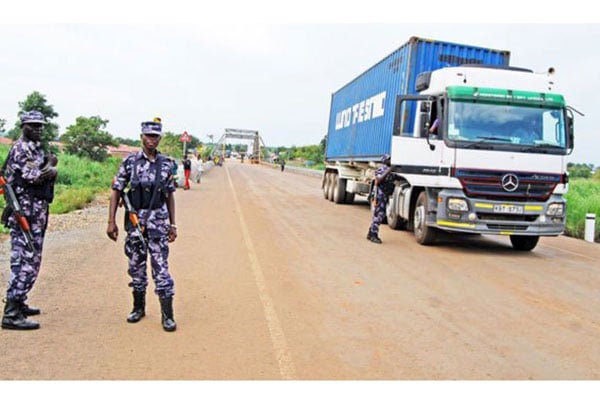Make Juba route safer for travellers

Uganda police officers man the Elegu Border point in northern Uganda. The Elegu-Nimule-Juba route is a major transport corridor for Uganda and South Sudan. PHOTO | FILE | NMG
What you need to know:
- The issue: Ambushes
- Our view: South Sudan alone cannot save itself, but concerted efforts by both the East African Community partner states to tame the volatile situation and secure travellers and businesses on the arterial business route to Juba.
The East African community partner states should listen to the cries of cross-border truck drivers who ply the Nimule-Juba route. The truckers, in desperation, are reported to have blocked the Elegu border point in Uganda on Monday, protesting ambushes across the border in strife-torn South Sudan (Daily Monitor, August 3).
The latest ambush killed a Kenyan trucker, in shootings that have persisted and see no end to them soon.
Sadly, for the desperate truck drivers, their plight has not been addressed conclusively.
Only in March, long-distance truckers, who ply the Nimule-Juba trade route, paralyzed transit movements when they parked their trucks and trailers at the same border-crossing, protesting unchecked shootings and killings of four of their members. The first protest attracted a high-level border security discussions between Ugandan officials and their South Sudan counterparts.
The teams then agreed on relay patrol convoy to protect travellers. The teams also instituted a coordinated operation to pinpoint and weed out informers who are domiciled among refugees in Uganda but with networks among the bandits. The teams further resolved to set up rapid response capabilities, activate joint monitoring teams, and share contacts for easy networking to secure the Elegu- Juba highway, among other things.
But these well-intentioned first-steps have all come to naught, given the unrestrained resurgence in the deadly ambushes. Not even South Sudan President Salva Kiir’s disarmament campaign, launched across the country In July last year, has helped to stop the cycle of violence.
This is why the wider East African community and the Inter-governmental Authority on Development (Igad), should mind these road attacks. Foremost, they are not good for good neighbourliness, free trade and commercial order in the region. Moreover, the attacks undermine prospects of lucrative businesses that had pulled in men from Uganda, DR Congo, Kenya, and as far afield as Ethiopia and Eritrea in the Horn of Africa.
The broader approach to sorting out this mess of ambushes would be to quicken the implementation of the 2018 peace accord and formation of a unity government in Juba with a firm grip on its outlying states and counties. This would, as was planned, push for the unification of all forces and disbarment of footloose militias marauding the countryside. This would revitalize the hopes that ushered in the Comprehensive Peace Agreement in 2005, which saw South Sudan become a lucrative business destination and hub for many in the region and overseas.
In sum, South Sudan alone cannot save itself, but concerted efforts by both the East African Community partner states to tame the volatile situation and secure travellers and businesses on the arterial business route to Juba.




